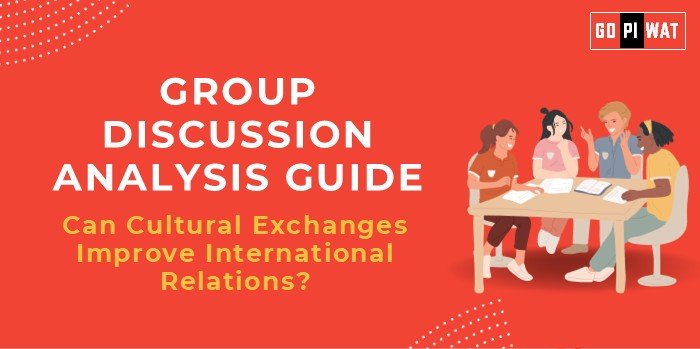📋 Group Discussion Analysis Guide
🌐 Can Cultural Exchanges Improve International Relations?
📖 Introduction to the Topic
Opening Context: In a world increasingly divided by political and economic competition, cultural exchanges act as bridges, fostering mutual understanding and collaboration. They have been a cornerstone of soft power diplomacy for decades.
Topic Background: From the Cold War era cultural diplomacy programs to contemporary student exchange initiatives like Fulbright and Erasmus, cultural exchanges aim to build trust, reduce misunderstandings, and establish long-term partnerships between nations. Recent global challenges, such as the pandemic and geopolitical tensions, have renewed interest in the power of cultural diplomacy.
📊 Quick Facts and Key Statistics
- 🌍 Global Exchange Programs: 300,000+ students participate annually in the Erasmus program, fostering European integration.
- 💰 Economic Impact: UNESCO estimates cultural tourism accounts for 40% of global travel.
- 📈 Soft Power Rankings: Countries with robust cultural exchange programs, like France and Japan, consistently rank high in global soft power indices.
- 👥 Youth Engagement: 70% of Fulbright scholars report greater openness to global collaboration post-program participation.
🌟 Stakeholders and Their Roles
- 🏛️ Governments: Design and fund cultural exchange programs, leveraging them for diplomacy.
- 🤝 NGOs: Facilitate grassroots cultural exchange projects in areas like art and education.
- 🎓 Educational Institutions: Foster student and faculty exchange programs, research collaborations.
- 👥 Citizens: Act as cultural ambassadors, sharing authentic cultural experiences.
🏆 Achievements and Challenges
✨ Achievements
- ✅ Enhanced Mutual Understanding: The US-China Fulbright program improved academic ties despite political tensions.
- 💼 Economic Growth: Japan’s cultural tourism campaigns post-2020 revitalized its economy.
- 🤝 Conflict Resolution: Israeli-Palestinian cultural initiatives created neutral spaces for dialogue.
⚠️ Challenges
- 🚨 Political Barriers: Restrictions due to visa policies and geopolitical rivalries.
- 📖 Cultural Misrepresentation: Oversimplified portrayals leading to stereotypes.
- ⚖️ Unequal Access: Limited opportunities for marginalized communities.
📘 Global Comparisons:
– Success: France’s Alliance Française promotes French culture in over 130 countries.
– Challenges: Decline in US cultural diplomacy budgets post-Cold War hindered global reach.
💬 Structured Arguments for Discussion
- ✅ Supporting Stance: “Cultural exchanges build trust that transcends political boundaries, fostering long-term alliances.”
- ❌ Opposing Stance: “Without addressing systemic inequalities, cultural exchanges risk reinforcing global power imbalances.”
- ⚖️ Balanced Perspective: “While cultural exchanges promote understanding, their true impact depends on equitable access and reciprocal engagement.”
💡 Effective Discussion Approaches
- 🌏 Opening Approaches:
- “Consider the role of cultural exchanges in historical peace efforts, such as the Cold War thaw.”
- “How might modern digital platforms enhance cultural exchanges globally?”
- 🤔 Counter-Argument Handling:
- Highlight examples of successful bi-directional exchanges like US-India academic collaborations.
- Propose solutions for inclusivity, such as scholarships and digital exchange platforms.
🔍 Strategic Analysis of Strengths and Weaknesses
- 💪 Strengths: Universal appeal across ideologies; long-term relationship-building.
- ⚖️ Weaknesses: Dependent on political goodwill; high cost of implementation.
- 📈 Opportunities: Leveraging technology for virtual exchanges; expanding cultural tourism post-pandemic.
- ⚠️ Threats: Rising nationalism limiting international collaboration.
🎓 Connecting with B-School Applications
- 🌍 Real-World Applications: Cultural exchange programs align with international business strategies, crucial for global market understanding.
- 💬 Sample Interview Questions:
- “How do cultural exchanges contribute to a country’s soft power?”
- “What challenges must be addressed for cultural exchanges to thrive in today’s polarized world?”
- 💡 Insights for Students:
- Cultural awareness and soft power skills are invaluable in cross-border business dealings and negotiations.
- Explore case studies of cultural exchanges to understand their impact on global business environments.


